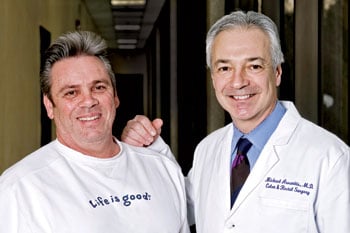Colon cancer, defeated
Today's laparoscopic colon surgery means a smaller scar and a quicker recovery.

Colorectal cancer is the second most common form of cancer in the United states, affecting approximately 130,000 americans and causing more than 45,000 deaths annually.
Traditionally, colon surgery to cure colorectal cancer has been performed through an eight- to 12-inch incision, allowing surgeons to work inside the opening to remove a portion of the diseased bowel and reconnect the two remaining sections. But with laparoscopic surgery, a large “open” incision no longer is needed. instead, surgeons operate through several small incisions through which they insert a laparoscope and special instruments to perform the same procedure.
“The advanced visualization of the laparoscope gives us a better view than seeing the surgical site with the naked eye,” explains board-certified colorectal surgeon Michael Arvanitis, M.D., section chief of colon and rectal surger y at Monmouth Medical Center. “We are able to watch the enlarged image of the patient’s internal organs on a tele- vision monitor as we perform the procedure through the small openings.”
Laparoscopic colectomy was introduced at Monmouth nearly 20 years ago, and starting in 2001 the hospital became one of the first in New Jersey to plan laparoscopic colectomy for all such surgeries done on an elective basis. Monmouth’s colorectal surgeons have performed nearly 1,000 procedures, making Monmouth Medical Center a leading facility in the state for this type of cutting-edge surgery.
“This procedure is proving extremely effective in treating colon cancer, benign polyps and diverticulitis, as well as other diseases of the colon,” he says. “Because of our experience in this sophisticated technique, a growing number of patients are becoming candidates for the procedure, reducing their risk for complications that can result from open surgery.”
For colon cancer patients like Mike Ferraro of Hazlet and Eatontown resident Bruce Comins, this minimally invasive technique resulted in less pain and scarring, a shorter hospital stay, quicker recovery and lessened overall disability. Patients undergoing laparoscopic colectomy also are less likely to lose a large amount of blood or develop wound infections or abdominal hernia.
Ferraro, a 58-year-old English and creative writing teacher who has taught in the Holmdel Public school system for 36 years and who was diagnosed with the disease in 2005, says he never doubted where to turn for his treatment.
“i choose my doctors very carefully,” he says. “i had been going to Dr. Arvanitis since age 40 for colon cancer screenings, and when i was diagnosed with cancer—knowing his reputation—i put my faith in him.”
in September 2005, Dr. Arvanitis performed a laparoscopic resection of the transverse colon, a procedure requiring advanced surgical skills.
“Dr. Arvanitis is highly regarded by everyone,” adds Ferraro. “after he removed three feet of my colon, i have only a tiny scar and had a very quick recovery. My surgery went so well that for me the hardest part of my treatment was the six months of chemotherapy that followed, and dealing with the side effects of that.”
For Bruce Comins, a 44-year- old resident of Eatontown with a 30-year history of ulcerative colitis, recovery from the laparoscopic colectomy was similarly quick. He recalls that when he was growing up in upstate New York, he played Little League and had a typically active childhood despite the illness, a form of inflammatory bowel disease. He says his disease was managed well with medications until in recent years he developed dysplasia, a condition considered to be a sign that normal cells are undergoing a change toward becoming cancerous.
People with ulcerative colitis are most at risk for developing colon cancer from dysplasia, and while Comins tried alternative medical treatments to manage the condition, eventually he realized that he would need surgery to remove the diseased portion of his colon.
In April of 2009, he underwent a laparoscopic colectomy, which revealed the development of colon cancer, and Dr. Arvanitis removed his large intestine.
“Dr. Arvanitis told me that one out of 47 lymph nodes was malignant, so I did have to go through chemotherapy,” he recalls.
In November, after healing from the surgery and completing the course of chemotherapy, he underwent a second, less complicated surgery six weeks later to reverse the temporary ileostomy created during the first operation to divert the intestinal contents to an appliance that is placed on the abdomen.
“Today I feel great,” he says. “My body is still adjusting to the way it now has to function, but my recovery from the surgeries was great.”
And while Comins points to more and more family members being diagnosed with diverticulitis, a noncancer- ous disease of the colon, Ferraro—who has hereditary non-polyposis colorectal cancer (HNPCC), the most common known hereditary colon cancer—notes a strong family history of colon cancer that extends to three grandparents, his mother, two aunts and a younger brother. He cites his enrollment in the Familial Colorectal Cancer Registry Program at Monmouth as another key strategy for surviving cancer.
In conjunction with the High-Risk Cancer Assessment Program at the Leon Hess Cancer Center, the Familial Colorectal Cancer Registry Program offers a multispecialty team approach to the assessment of family risk, genetic counseling and testing and treatment of polyps and cancer.
The main role of the registry is to promote knowledge of the risks and implications of a family history of colorectal cancer. A geneticist provides patients with educa- tion about the disease, tests, surgical options and lifelong surveillance protocols as well as the appropriateness of genetic testing. At Monmouth, the program also provides support to ease fear of tests and surgeries and encourages participation in study protocols.
Married 36 years with a 31-year-old son and 28-year- old daughter, Ferraro says he encourages his children to make sure they’re followed closely. A volunteer with the American Cancer Society who counsels newly diagnosed patients, he notes that “you have cancer” are among the three worst words a person can hear, and says his philosophy is “You have to save time for laughter between the tears.”
“I don’t want anyone to join the cancer club, but those who do should know that it actually can change your life in a positive way,” he says. “For me, it was an uplifting and comforting time, as there really were angels—the people who cared for me and supported me during my treatment.
“I have excellent insurance and could have gone anywhere for my treatment,” he adds. “People in our community who are diagnosed with cancer need to know that we have great care right here, close to home. I’m very happy with Monmouth Medical Center, where all my doctors are, and where all my testing is done.”

